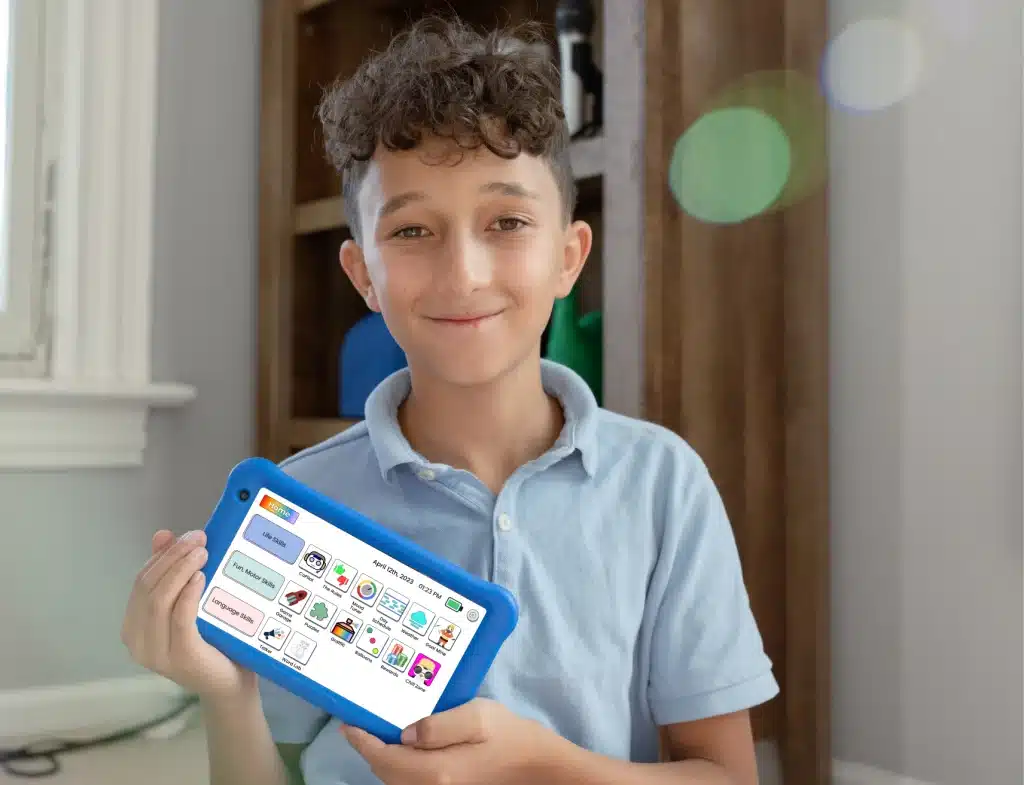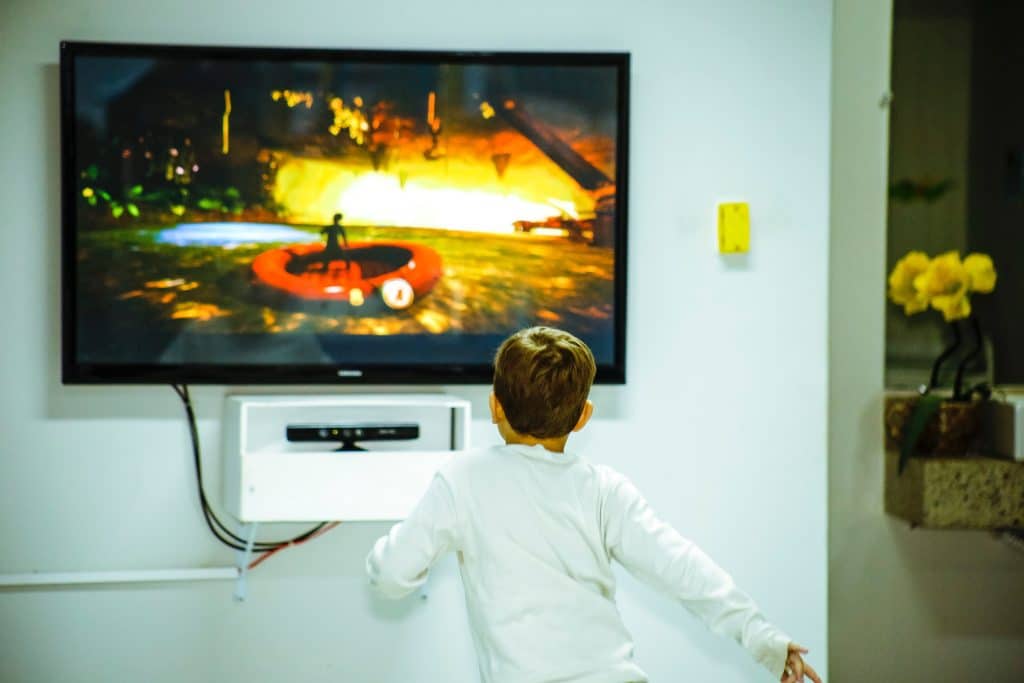As a licensed practitioner who works with kids every day, I often see the joy and excitement that screens can bring. Whether it’s watching their favorite show or playing an educational game, screens have become a significant part of children’s lives. However, it’s crucial to ask, should parents limit screen time? In this blog, we’ll explore why managing screen time is important, the impact it has on kids’ development, and how parents can set healthy boundaries.
Table of Contents
Understanding the Impact of Screen Time
Screen time can be both beneficial and harmful, depending on how it is managed. The key is balance. Excessive screen time can lead to issues like obesity, sleep problems, and behavioral issues. On the other hand, educational content can enhance learning and development. But, how do you strike the right balance? Let’s explore the impact of screen time on your kids’ health and well-being.

Read more: Recommended Screen Time by Age
Physical Health Concerns
Kids need to be active to stay healthy. According to the American Academy of Pediatrics, children aged 6 years and older should get at least one hour of physical activity per day. Too much screen time often means less time for physical activities, which can lead to obesity and other health problems.
- Obesity: Increased screen time is linked to a higher risk of obesity in kids. They are more likely to snack mindlessly and miss out on physical activities.
- Sleep Problems: The blue light from screens can interfere with the production of melatonin, a hormone that regulates sleep. This can make it harder for kids to fall asleep and stay asleep.
Understanding these physical health concerns helps us see why balancing screen time is so important.
Mental and Emotional Health
Excessive screen time can also affect kids’ mental and emotional health. Studies have shown that too much time spent on screens can lead to increased anxiety, depression, and behavioral issues.
- Anxiety and Depression: Kids who spend more time on screens are more likely to experience anxiety and depression. They may feel isolated and disconnected from the real world.
- Behavioral Issues: Excessive screen time can lead to problems with attention and behavior. Kids may become irritable and have difficulty focusing on tasks.
By being aware of these mental and emotional impacts, we can take steps to mitigate them.

Give your kid an independent future. Goally has 15+ learning apps that teach life skills. There are NO web browsers, social media, or YouTube.
Our apps teach executive function, language, emotional regulation, finger dexterity skills, and more. It also 100+ video classes teaching social skills.
Setting Healthy Screen Time Boundaries
So, should parents limit screen time? Yes, but with a balanced approach. Here are some practical tips to help you set healthy boundaries for your kids:
Implementing these strategies can make managing screen time easier and more effective.
1. Create a Family Media Plan
A family media plan can help you set clear rules and expectations for screen time. Involve your kids in creating the plan, so they understand the reasons behind the rules. Make sure to include time for physical activities, homework, and family time. A family media plan makes screen time guidelines clear and achievable.
2. Set Screen-Free Zones
Designate certain areas of your home as screen-free zones. For example, the dining room can be a place where you enjoy meals and conversations without the distraction of screens. Bedrooms should also be screen-free to promote better sleep. Screen-free zones can help reduce distractions and improve focus on other activities.
3. Lead by Example
Kids often imitate their parents’ behavior. If you want your kids to have healthy screen time habits, you need to model those behaviors yourself. Set aside your devices during family time and show your kids that there are other ways to have fun and relax. Leading by example is a powerful way to teach healthy habits.
Balancing Screen Time with Other Activities
It’s not about eliminating screen time entirely but about finding a healthy balance. Here are some activities that can help balance your kids’ screen time:
- Outdoor Play: Encourage your kids to play outside. Activities like biking, playing sports, or simply running around can help them stay active and healthy.
- Reading: Foster a love for reading by setting aside time for books. Reading can improve your kids’ language skills and stimulate their imagination.
- Family Activities: Plan activities that the whole family can enjoy together, like board games, puzzles, or cooking. These activities can strengthen family bonds and provide a break from screens.
Balancing screen time with these activities promotes a healthier lifestyle.

Read more: How Much Screen Time is Healthy?
Technology as a Tool for Learning
While it’s important to limit screen time, it’s also important to recognize that technology can be a valuable tool for learning. Here are some ways you can use technology to enhance your kids’ education:
- Educational Apps and Games: There are many educational apps and games that can help your kids learn new skills. Look for apps that are age-appropriate and offer interactive learning experiences. These can be a great way to make learning fun and engaging.
- Online Learning Resources: The internet is a treasure trove of educational resources. Websites like Khan Academy and National Geographic Kids offer a wealth of information on a wide range of topics. Encourage your kids to explore these resources and learn about the world around them.
Monitoring and Adjusting Screen Time
It’s important to regularly monitor and adjust your kids’ screen time. Here are some tips to help you do that: Regularly monitoring and adjusting screen time can keep it balanced and beneficial.
Use Parental Controls
Many devices and apps offer parental controls that allow you to monitor and limit your kids’ screen time. Use these tools to set time limits and block inappropriate content. Parental controls are useful tools for managing screen time effectively.
Have Regular Check-Ins
Have regular check-ins with your kids to discuss their screen time habits. Ask them how they feel about the time they spend on screens and if they have any concerns. Use these conversations to adjust your family media plan as needed. Regular check-ins can help you stay connected and informed about your kids’ screen time habits.
Goally | Apps To Support Child Development
Looking for fun ways to help your child learn life skills? Try Goally! The Goally tablet comes with award-winning learning apps and video classes to help kids develop the skills they need to become independent with FUN & evidence-based practices.

Our apps teach executive function, language, emotional regulation, finger dexterity skills, and more.
As your child develops new skills, you can increase the difficulty level of the tasks in the app to challenge and motivate them even further. This helps your child grow and progress at their own pace, while also keeping them engaged and excited about their development.

Should parents limit screen time? Absolutely. By setting healthy boundaries and balancing screen time with other activities, you can help your kids develop healthy habits that will benefit them for life. Remember, the goal is not to eliminate screens entirely but to use them in a way that enhances your kids’ development and well-being.
Resources:
FAQs about Should Parents Limit Screen Time
Why is it important to limit screen time for kids?
Limiting screen time is crucial because excessive use can lead to physical health issues like obesity and sleep problems, as well as mental health concerns such as anxiety and depression. It ensures a balanced lifestyle with time for physical activities, social interactions, and learning.
How much screen time is appropriate for children?
The American Academy of Pediatrics recommends no more than one hour of screen time per day for children aged 2 to 5 years, and consistent limits for older kids to ensure they get enough sleep, physical activity, and other healthy behaviors. For children 6 years and older, a family media plan that prioritizes quality content is advised.
Can screen time be beneficial for kids in any way?
Yes, screen time can be beneficial when it involves educational content that enhances learning and development. Interactive and age-appropriate apps, games, and programs can be valuable tools for education.
What are some effective strategies for managing kids' screen time?
Creating a family media plan, designating screen-free zones, and leading by example are effective strategies. These approaches help set clear expectations and encourage a healthy balance between screen time and other activities.
How can I ensure my child's screen time is safe and productive?
Use parental controls to monitor and limit screen time, and choose high-quality educational content. Regularly discuss with your child their screen time habits and make adjustments as needed to ensure a balanced and enriching experience.
This post was originally published on October 6, 2023. It was updated on June 7, 2024.

Goally
We help parents teach their kids life skills, like doing bedtime and morning independently. Backed by science, we incorporate evidence-based practices and expert-informed designs in all of our apps and content.





